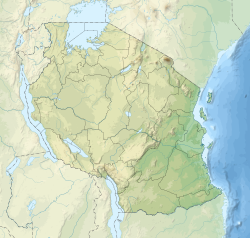Top Qs
Timeline
Chat
Perspective
Galula Formation
Geological formation in Tanzania From Wikipedia, the free encyclopedia
Remove ads
The Galula Formation is a geological formation located south of Lake Rukwa in Tanzania, part of the Red Sandstone Group of the Rukwa Rift Basin. Along with the unconformably overlying Oligocene Nsungwe Formation. It is divided into two members, the lower Mtuka Member and the upper Namba Member.[1]
The age of the deposit is poorly constrained, with the Mtuka Member likely being Aptian to Cenomanian in age, while the Namba Member being Cenomanian to Campanian in age based on Geomagnetic reversals.[2] It is correlated with the Dinosaur Beds of Malawi.
The formation is fossiliferous, with Dinosaurs and Crocodyliformes being known from the formation.
Remove ads
Geology
Lithology
The Lithology of the formation is a sequence of red, pink, purple and occasionally white colored sandstones, conglomerates and mudstones. The Mtuka member is 160–180 m thick in the type section, and is typified by coarser sandstone, a higher frequency of conglomerates, higher proportions of extraformational clasts, thicker and a greater frequency of overbank siltstone and mudstone lenses and a higher proportion of paleosols. While the Namba member is between 340–360 m in the type section, and is less variable in facies, predominated by very fine-to medium-grained sandstones with less overbank mudstone and siltstone lenses.[1]
Remove ads
Vertebrate paleofauna
Fish
Crocodyliformes
Dinosaurs
Turtles
Mammals
Remove ads
References
Wikiwand - on
Seamless Wikipedia browsing. On steroids.
Remove ads


